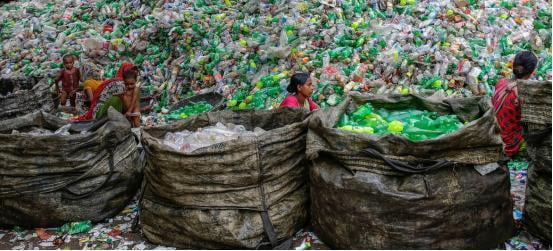Women workers sort plastic bottles for recycling at a factory in Dhaka, Bangladesh
The United Nations Conference on Trade and Development said Feb. 3 that vigorous development of plastic alternatives is expected to reduce global plastic waste by about 63 million tons, or about 17 percent of its total, by 2040. To this end, companies and countries must cooperate across borders to increase the production of plastic alternatives and address trade barriers.

UNCTAD notes that the global trade in plastics in 2021 is close to 370 million tons, enough to fill more than 18 million trucks, lined up to circle the globe 13 times. With less than 10 percent of all plastic produced being recycled, most of the products on these trucks will end up scattered in the streets and flooding the oceans.
UNCTAD emphasizes that nature is in fact rich in sustainable materials such as bamboo, sand, barberry plants and algae. These materials can be used to make alternatives to the straws, shopping bags, bottles, food packaging and other plastic products that people consume every day, thus becoming more environmentally friendly.
Plastic alternatives present huge economic opportunities
According to Henrique Pacini, an UNCTAD economist who studies trade and environment issues, such a shift would not only be good for the planet as a whole, but would also bring economic opportunities. The latest data show that the total global trade in plastic alternative materials and their products will be about $338 billion in 2020, equivalent to about one-third of the trade in plastic products made from fossil fuels.
Pacini said this shows that there is already a large market for plastic alternatives and that the growth potential is huge. He added, "Each country can focus on materials where it has an advantage in production, such as coconut shells and bamboo for many island countries in the Caribbean, Indian Ocean and Pacific."
Developed and developing countries need to strengthen cooperation
However, many companies in developing countries lack the technology and capacity to use these materials to produce finished or semi-finished products on a large scale, providing an opportunity for companies in developed countries to invest in developing countries and enhance their technology and skills.
Pacini stressed that "expanding the production of plastic alternatives will depend on the ability to strengthen cooperation between developed and developing countries."
Seaweed packaging
UNCTAD is currently working with NotPla, a London-based startup that works with seaweed to create biodegradable packaging alternatives.
Related trials have recently begun in Chile and Ghana, where the company is working with the United Nations and the environment ministries of both countries to test take-out boxes made from seaweed with edible liquid packaging.
Unlevel playing field
UNCTAD also noted that in addition to the need to increase cross-border production, countries should also work together to address trade barriers and eliminate incentives that are unfair to plastic alternatives. For example, most fossil fuel-based plastics are eligible for more subsidies and lower import tariffs than plastic alternatives.
Data show that the global average tariff on plastic straws is 7.7%, while the tariff on paper straws reaches 13.3%, which makes the latter uncompetitive. UNCTAD's legal officer in charge of trade and environment issues said, "In short, the current tariffs are making plastic cheaper, so people are reluctant to stop using it and will not go for nature-based alternatives."
Harmonized System Code
To help create a more level playing field, UNCTAD developed the first list of alternatives to plastics and their respective Harmonized System codes. This code is part of an internationally standardized naming and numbering system that enables countries to consistently classify products prior to export and import.
UNCTAD notes that this list with 282 HS codes is a useful addition to the work of the United Nations Intergovernmental Negotiating Committee. To end plastic pollution, the Commission is negotiating a legally binding instrument.
In addition, the list can support the WTO dialogue on plastic pollution and the role of alternatives, and can help implement the recently adopted Kunming-Montreal Global Biodiversity Framework.

